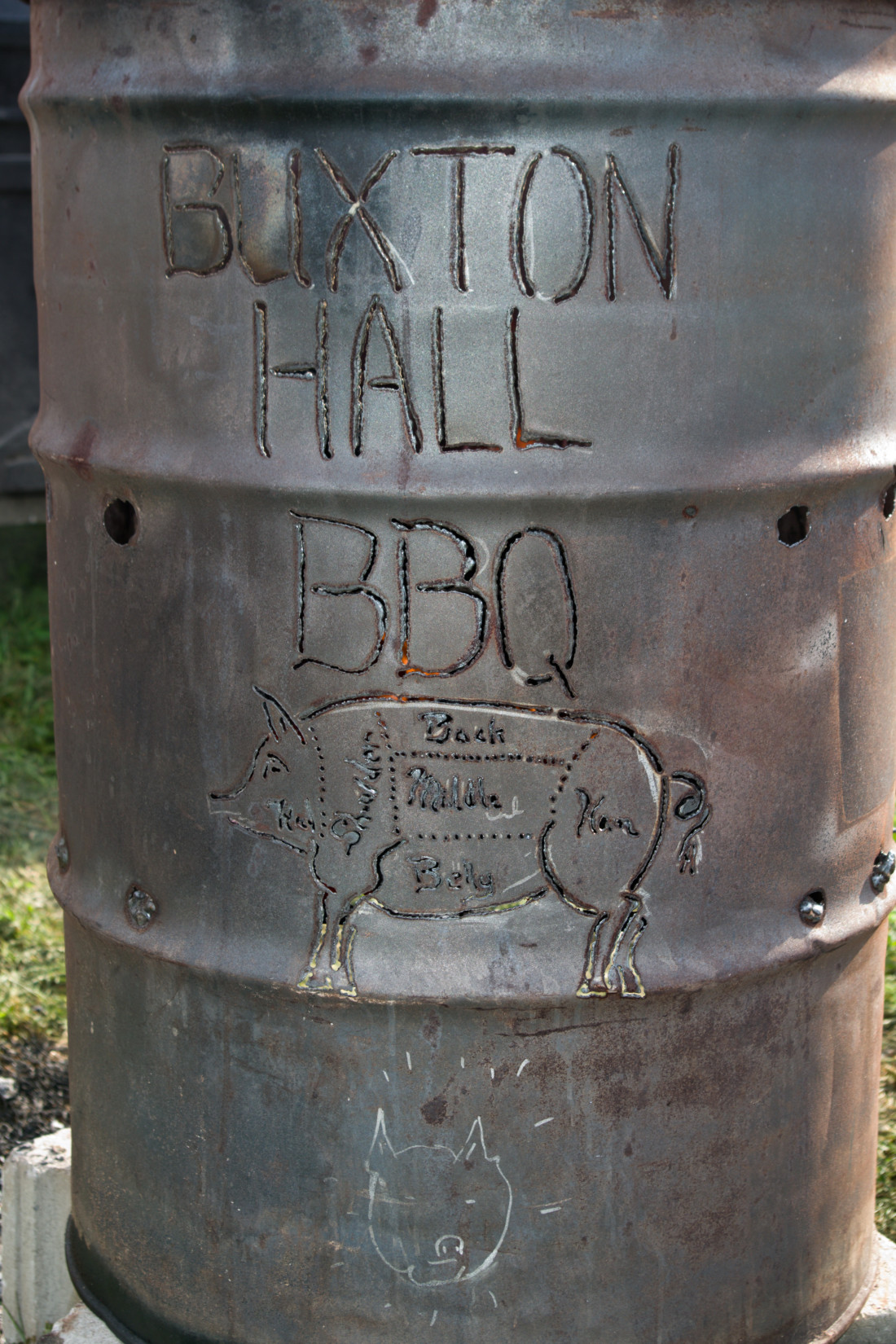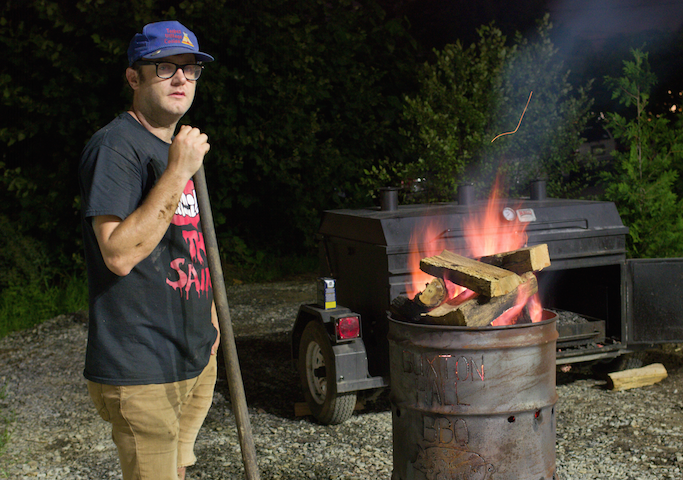It’s a muggy early winter day in Hemingway, S.C., just a short drive from Myrtle Beach. But sitting in the shade at a picnic table at Scott’s Bar-B-Que, soaking up the humidity and shoveling down some pulled pork, it’s really not a bad place to be. And that’s exactly where James Beard Award-nominated chef Elliott Moss found himself last December, along with business partner (and fellow James Beard nominee) Meherwan Irani, during an RV trip through North and South Carolina. Seeking to show Irani the roots of Moss’ cooking, the group (the two chefs plus this writer and a camera crew) drove a loop through the Carolinas, eating at dozens of ’cue pits and stopping at two of the most notable bastions of wood-fired barbecue in the country: Scott’s and the Skylight Inn (in Ayden, N.C.).
Scott’s is widely regarded as one of the best examples of Eastern-style South Carolina ’cue. The business has been in Rodney Scott‘s family for generations, winning obsessive fans from all over the world.
“It’s my favorite barbecue I’ve ever had, hands down,” Moss proclaims, cradling a scoop of pulled pork in a torn hunk of white bread as sauce drips onto the picnic table’s raw wood. “Rodney’s sauce is a little spicier than most folks’. And everything is cooked whole hog, over wood. Most places have changed that by now, but Rodney’s still doing it.”
“There are pits just like this in Africa,” says Scott. “People may do it different in different places, but the procedure is still the same. Wood, fire and a pit.”
It’s a small, roadside provisions store and barbecue joint in a town that barely even has a traffic light. But every car honks the horn as it passes the ramshackle structure’s bright-blue-and-white concrete walls. A two-door garage houses the pits, and smoke billows out as if from the end of a giant cigarette. These particular pits recently burned to the ground; that’s not uncommon in whole-hog, wood-fired barbecue houses, where controlled fires often burn 24 hours a day.
Pointing to several teenage boys sitting in the bed of a pickup truck, Scott observes, “It’s just a waiting game now. That’s the thing about making barbecue: You got to get real good at waiting.”
Feeding the hungry
Flash-forward to 2 a.m. on a hot night in early May, when Moss is doing just that. The fire’s orange glow is reflected in the lenses of Moss’ thick-framed wayfarer glasses as he stares patiently at the covered pit, en route to serving a crowd at Burial Beer Co. the next day. Built of cinder block and rebar, the pit sits in back of the brewery, where Moss has already hosted a wildly successful pig picking. “We fed almost 500 people the last time,” he says; little does he know that his July 4 cookout at Catawba Brewing Co. will end up feeding well over 600.
“I made some sandwiches if anyone’s hungry,” says Moss, always wanting to make sure that everyone is fed. He hands out plastic bags of sandwiches to the few of us gathered around the midnight pit, listening to the hiss and pop as the pig roasts, a sky full of stars overhead. Moss will be up all night, as he will every night once Buxton Hall, his eagerly awaited new restaurant, opens.
Nostalgia-driven
An homage to his upbringing in rural South Carolina, Moss’ cuisine centers on the simple, slow-cooked comfort foods of both the roadside barbecue stands and the country buffets. Scratch-made potato salads, coleslaws, catfish stews, the South Carolina anomaly that is barbecued hash and that particularly endangered species of Carolina cuisine: chicken bog. It’s a testament to a time when down-home Southern food was made with fresh, local ingredients rather than boxed or corporately sourced components.
“My food is nostalgia-driven like a motherf**ker,” Moss says, laughing. “But so much of it is so deep-rooted in myself, I’m still just finding out about it.”
“A lot of those places use cornmeal from Sysco now,” he says. And many of the fixtures whose food he grew up eating, continues Moss, have also switched from wood-fired to gas pits. “Why would I buy that from Sysco when I can make hushpuppies [using Farm & Sparrow cornmeal] that support my friend’s family — and his s**t is better than theirs?”
Counting down the days
Standing in Buxton Hall’s dining room as construction workers hammer away, Moss seems eager to see it finished. Most of the considerable delay (it took more than a year just to complete the building’s shell) has been due to the lengthy process of working with the city to figure out how the hell one safely installs massive, wood-burning pits (which are typically located in a separate building) in an indoor kitchen — and in the central business district, no less.
“It took so long, but in the end, wood-burning grills are basically the same thing as what we’re doing: These are just bigger,” he says. In fact, these pits can accommodate three entire pigs at once. The Buxton Hall kitchen is open, meaning patrons will be able to watch the pitmasters smoking the hogs right behind the service line and the fire being tended right next to it.
As of now, Buxton Hall hopes to open on Tuesday, Aug. 18. “I’m just dreading that [inspectors will] come in here and say, ‘We know we told you that you could do this … but there’s no way you can do this’ — which is entirely possible!” jokes Moss. But as the ubiquitous hashtag has read for over a year now, #Buxtoniscoming — and this time, it really does seem to be just around the corner.
Buxton Hall Barbecue is scheduled to open Tuesday, Aug. 18, at 32 Banks Ave. Visit Facebook.com/buxtonhall or check the Twitter hashtag #buxtoniscoming for updates.





Before you comment
The comments section is here to provide a platform for civil dialogue on the issues we face together as a local community. Xpress is committed to offering this platform for all voices, but when the tone of the discussion gets nasty or strays off topic, we believe many people choose not to participate. Xpress editors are determined to moderate comments to ensure a constructive interchange is maintained. All comments judged not to be in keeping with the spirit of civil discourse will be removed and repeat violators will be banned. See here for our terms of service. Thank you for being part of this effort to promote respectful discussion.